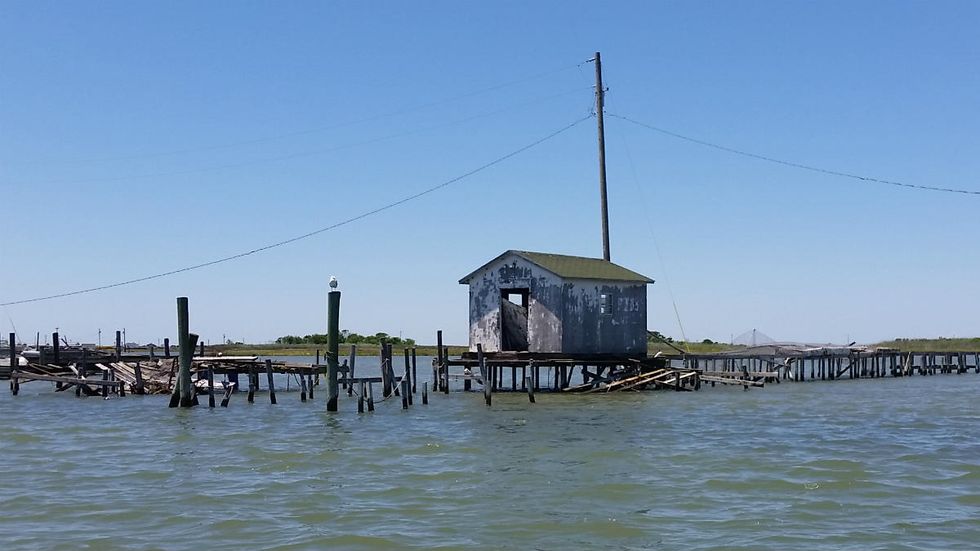
© 2024 Blaze Media LLC. All rights reserved.
Just a few miles off the Eastern Shore of Virginia lies Tangier Island, a small fishing community so isolated that it still speaks a 17th century English dialect, but its way of life is in trouble.
On this island, crabbers and fishermen, known as watermen, have been pulling a living out of the Chesapeake Bay by line, net, and trap for centuries.
But now, with a population that has dwindled from 1,200 to just over 450 in recent decades, Tangier’s mayor says that the island's way of life itself is threatened by the dual forces of erosion and government regulation.
“We’ve got a lot of erosion going on; that’s our main concern now,” Tangier Mayor James “Ooker” Eskridge said. “We need a seawall; we need protecting.”
Tangier’s erosion problem has been at the center of a years-long political struggle over a jetty that would help protect the island from washing away altogether. A seawall was built along the island’s western coast in 1989, preventing shoreline erosion by buffering the island from wave action. However, other parts of the island are being rapidly carried away.
“There are three main problems happening on Tangier: rising seas, a sinking island, and erosion from the wave action,” Jodi Smith, a doctoral student in coastal geomorphology at the University of Virginia, told WRIC in an interview in April. “Because Tangier is mostly made of very fine silty sediments that are easily carried away in large storms, rising sea levels and increased extreme weather puts it at risk.”
However, even the world’s best seawall won’t do much for a local economy hampered largely by environmental regulations.
Many of the watermen’s most recent regulatory troubles began with a license moratorium issued by the Commonwealth of Virginia’s Maritime Resources Commission (VMRC) in 1999, ostensibly to curb the effects of overfishing in the Chesapeake Bay. Essentially, no new licenses have been issued in the past 17 years, which has had a crushing impact on the watermen.
“This was done because the blue crabs were on the edge of extinction,” says Laurie Naismith, a spokeswoman for the VMRC. “Something had to be done and that’s when a partnership was formed with Maryland to come up with management strategies and some pretty severe measures to rebuild the stocks.”
“Some regulations are necessary, but you can regulate people out of business,” Eskridge said.
“You’ll read things about the watermen and the business and they’ll say that we’re harvesting too many crabs and some say the watermen want to catch the last crab or fish that’s out there,” he said. “That just doesn’t make any sense, because we’d be out of business. The resource [as it is called on the island] means more to the watermen than it does to any environmental group or agency.”
Naismith went on to acknowledge a number of factors lead to changed stocks, and that this year’s crab boom was also due in part to the VMRC’s management strategies. But when crab numbers drop, Mayor Eskridge said, environmental regulations are almost always certain to follow and “targeting the watermen is the easiest thing to do.”
That “targeting” has also had an adverse effect on the island’s youth. Thanks to the moratorium, getting into the family businesses is nothing but a dream for many of them who are now forced to leave the island in search of higher education or work elsewhere.
“For a guy graduating high school to get into the business, somebody has to get out of it,” Eskridge explained. “Either a family member hands his license down to him or someone gets out of the business and sells his license.”
Some who have grown accustomed to living on the water have sought employment in other maritime industries elsewhere along the coast. “A lot of folks now, they actually work on tugboats,” he says. “They’ve been on the water all their lives so now they’re working for tugboat companies out of New York and Philly. Some work down in the Gulf.”
In light of the seemingly never-ending series of setbacks in the crabbing and fishing industries, the island’s economy has adapted slightly to invite tourism revenue, boasting museums, two ice cream parlors, and a bed and breakfast, while some of the watermen have begun offering eco-tours on the Chesapeake. While the income may be helpful, it still isn’t enough, according to Eskridge.
“We have visitors from all over the country and the world now. And that revenue is nice, but it’ll never replace the water business.” The water business is all Eskridge, a lifelong waterman who learned it from his father and passed it on to a son, has ever known. “It’s very frustrating. If you’re going to regulate a group of people, at least understand the business. They wouldn’t want me telling farmers what to plant or how much … But you have a lot of folks that are regulating that don’t understand the business.”
These hearty people aren’t looking for pity, just protection from a receding shoreline and the freedom to work as they have for centuries. “We just need [erosion] protection and we need to be able to keep working,” reiterated Eskridge. “We don’t ask for handouts or welfare or anything, just let us go to work.”
Want to leave a tip?
We answer to you. Help keep our content free of advertisers and big tech censorship by leaving a tip today.
Want to join the conversation?
Already a subscriber?
more stories
Sign up for the Blaze newsletter
By signing up, you agree to our Privacy Policy and Terms of Use, and agree to receive content that may sometimes include advertisements. You may opt out at any time.
© 2024 Blaze Media LLC. All rights reserved.
Get the stories that matter most delivered directly to your inbox.
By signing up, you agree to our Privacy Policy and Terms of Use, and agree to receive content that may sometimes include advertisements. You may opt out at any time.



